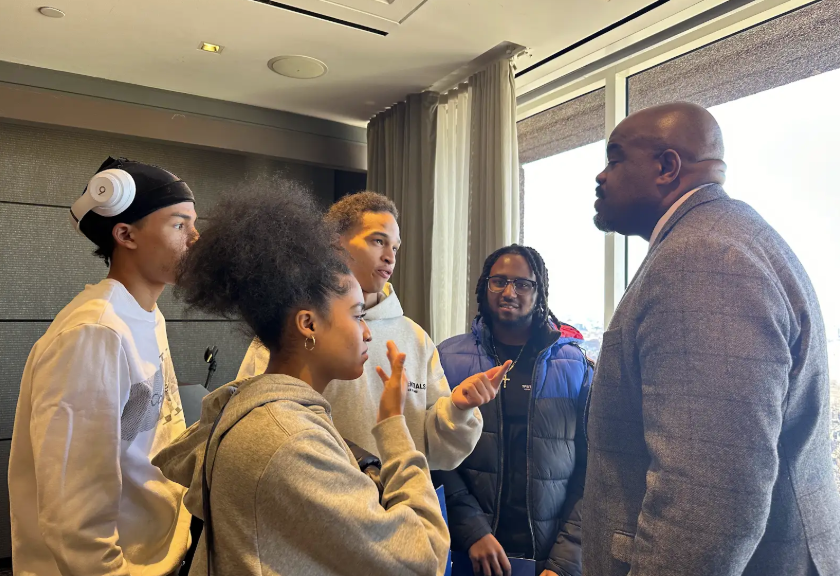Empowering the Next Generation of Changemakers
“There are things we can help change if we put work into it,” said one Massachusetts student.
This simple but powerful statement captures the essence of the Rennie Center’s Student Changemakers program. Over the course of a semester, this young changemaker—and others like them—identified a challenge in their community, investigated its root causes, and developed a solution grounded in original research. Their words perfectly sum up why we launched Student Changemakers: to equip students with the knowledge and skills to address issues that matter most to them and their communities.
For years, the Rennie Center has worked to build the capacity of educators, leaders, and community members to use research and data to drive meaningful improvements in education. With Student Changemakers, we recognize that students themselves can lead this work.
Launched in 2022, Student Changemakers empowers young people to become the change they want to see through a Youth Participatory Action Research (YPAR) process. The program offers a flexible, 18-lesson curriculum that guides students through each step of an evidence-based change process: from crafting research questions to collecting data through surveys, interviews, and observations to analyzing findings and crafting effective presentations. Each lesson fits into a standard 45–50 minute class period, making it easy to integrate into existing courses and schedules.
As students move through the process, they build real-world skills like project management and research, while also developing social-emotional and civic competencies such as collaboration, critical thinking, public speaking, advocacy, and community organizing. By applying classroom learning to authentic challenges, students grow into informed, engaged citizens ready to shape their communities—both now and in the future.
Our team first piloted the Student Changemakers program at the Jeremiah E. Burke Middle School in Boston with a cohort of 21 eighth-grade students. As we refined lesson plans and offered hands-on support, students researched specific topics of concern, like improving school lunches and creating calming spaces in classrooms. They identified actionable solutions and presented their ideas to peers and educators.
“It was inspiring to see the breadth and depth of change that students envisioned for their school community,” said Amanda Chung, a Rennie Center Senior Associate. “Students participated with enthusiasm throughout both semesters at the Burke. During end-of-semester presentations, students outside of Changemakers showed interest in the work, asking questions about research projects and even asking how they could get involved in the program themselves.”
Building on lessons learned from the Burke, Student Changemakers expanded to three additional schools:
- Full Circle, an alternative, therapeutic middle and high school in Somerville;
- TechBoston Academy, a middle and high school in Dorchester; and
- Westport Middle High School in Westport.
At each site, our team partnered with educators to adapt lesson plans to fit the unique strengths and needs of their classrooms. To support implementation, we also established a community of practice, where participating educators shared best practices, workshopped challenges, and provided feedback on lesson plans.

This year’s student projects addressed issues ranging from gun violence to substance abuse to food insecurity. Most impressively, the students’ work did not end with their presentations, but led to real-world action. At TechBoston Academy, after research revealed that 13 is the average age for first-time drug and alcohol use, a group of high school students delivered a drug prevention course to middle school students. At Full Circle, students launched a committee with adult support to establish a community fridge in response to their research on food insecurity. Another group from TechBoston got city councilors to sign commitments to reducing gun violence. Some students were even able to attend the Rennie Center’s Condition of Education in the Commonwealth event and talk with Massachusetts Secretary of Education Patrick Tutwiler.
“The Changemaker process is about so much more than students being able to point to a tangible, material change that came about as a result of their work. It is about teaching students the skills they need to be civically engaged in the future,” said Chung.
Preliminary evaluation data from this year’s Changemakers program shows promising results. Participants reported an average 12 percent increase in confidence in skills like identifying a problem, conducting research, collecting data, and presenting information.
“Skills that I have developed through participation in the Student Changemakers program are learning how to get the attention of a room, speaking out against problems, and being able to listen to other people’s ideas before making the final plan,” one student reflected.
Perhaps most significantly, students felt a stronger sense of agency and belief in their capacity to drive change. The percentage of participants who felt “empowered” or “very empowered” to shape school decisions rose by 36 percent.
“The biggest lesson that I learned is that you need to get your voice out to make a difference,” said another student.
We want all students to have the confidence to make their voices heard. Equally important, we need to ensure students develop the knowledge and skills to analyze the world around them, navigate complex sources of information, and make informed decisions about how best to leverage their own power and ideas for change. That’s why we are currently looking for more schools and educators to partner with next year and beyond! Educators receive a flexible, adaptable YPAR curriculum, professional learning support, connections to education leaders, and a stipend ($1,500 per semester for one educator, $2,000 for two).
Applications are now being accepted on a rolling basis. If you are interested in participating in Student Changemakers, please fill out an application or contact Amanda Chung or Chau Ngo with any questions.
